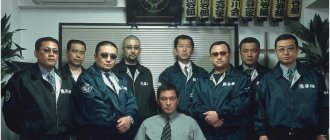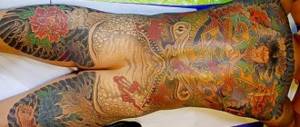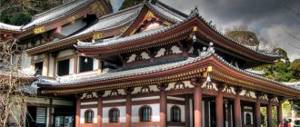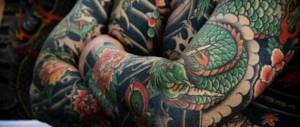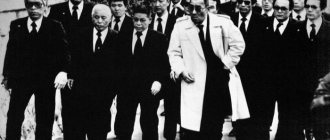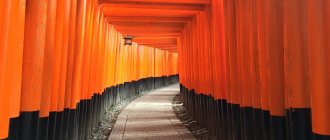Yakuza are members of traditional Japanese criminal groups. They are often referred to as gokudo or power groups. In our world, the Yakuza are among the largest organized crime groups. Japanese lawyers call them borekudan. The word is translated as “power group”. For group members, the term is offensive because it applies to different forms of crime. Media outside the Land of the Rising Sun, when talking about who the real yakuza are, call them the Japanese mafia.
Borekudan
The history of the Yakuza, how and when it appeared
Although traditional criminal gangs are well known in the Land of the Rising Sun and beyond, the exact origins of the phenomenon remain a topic of debate. It is believed to come from hatamoto-yakko, kabuki-mono - people belonging to the lower ranks in the 17th century. Representatives of the mafia themselves associate themselves with machi-yakko, groups that protected populated areas from attacking hatamoto-yakko robbers. Mati-yakko were real folk heroes, although they were also responsible for many crimes.
Crime researchers believe that organized groups emerged during the Edo era, when peace imposed by the Tokugawa left many soldiers unemployed. In conditions of isolation and limited connections with the outside world, agriculture developed, merchants became rich, and the dependence of the military class on merchants increased. Then a period of famine and natural disasters began, and there were more ronins who lived not only by crimes, but also by protecting villages. In large populated areas there were several organizations fighting for resources and power. Often ordinary people became victims of rivalry.
Japanese bandits
Mostly modern groups trace their history back to tekiya (formerly traders of bad goods) and bakuto (organizers of gambling). Tekiya peddlers in the Edo era were considered one of the lowest social strata, but the formation of an internal organization made it possible to seize a number of administrative functions and subjugate trade in certain areas of the capital. Over time, tekiya received official recognition, and oyabun employees were allowed to wear a sword and were allowed to take a surname. Bakuto players were lower than tekiya in the social hierarchy, since gambling had always been illegal in Japan. Small establishments opened in holy places on the outskirts; the organizers hired their own security. The Bakuto were considered a despicable class; They themselves called themselves the Yakuza. Organized crime consisted of outcasts incapable of social adaptation.
Japanese urbanization affected the entire society, including the criminal one. A new word was said in the history of the Yakuza - gurentai. This was the name given to undisciplined youth who lived in banditry. Previously, the Gurentai participated in conflicts between trade unions and workers' associations. The fact of the existence of the Gurentai influenced the life of the country: militarization allowed members of the groups to enter politics. They formed the right wing of the Ueku (ultra-nationalists). For the Ueku, peace was not limited to specific territories; they set themselves the goal of political violence. Before World War II, the largest group of this kind was the secret Kokuryu-kai, which included many officers, officials, and athletes who chose the path of murder and terror. The gang brought opium from the Great Land (from China), spied for the official authorities, and covered up prostitution.
After the war, Yakuza members focused on the black market and took control of ports and entertainment venues. The largest community is the Kansai Yamaguchi-gumi, which captured Kobe and Osaka. Attempts to fight the group were made by the Americans who occupied the territory of the country, but in 1950 they had to admit defeat. The bandits adopted firearms and expanded their sphere of influence. Teriya, Bakuto and Gurentai entered into a rivalry. In the 1960s, through the efforts of activist Yoshio Kodama, the ruling circles were reconciled, but minor skirmishes remained commonplace.
Japanese mafia
origin of name
Yakuza is a compound word:
- I am eight;
- Ku - nine;
- Dza – san (three).
The sum (21) is the worst number in the Bakuto card game. At first the word meant a useless thing, then people began to be called that. The criminals who traded in Bakuto were considered the lowest social class, so over time it was they who were renamed the Yakuza. The bandits themselves call everyone who does not belong to their stratum katagi (“suckers”).
Yakuza are the opposite of katagi
The most famous
Tadamasa Goto is one of the most famous yakuza. His career started in 1972. Goto served serious bandits, then became the head of the huge Goto-gumi clan. In 2001, he worked with the FBI, selling information on deals and members of allied gangs. In gratitude, Goto received funds for a liver transplant; donated $100,000 to the hospital. The scandal did not prevent him from retaining his place as head of the family for another 7 years, and after completing his criminal career, he entered a monastery, becoming a Buddhist priest, although in 2010 he was accused of murder. By paying the victim's relatives $1,500,000, he retained his freedom.
The clinic, impressed by the yakuza's gift, immortalized his name with a strain of plague researched by the facility's doctors. In 2010, Goto published his memoirs, revealing details of the life of criminal circles.
Some mafiosi write memoirs
Triad weapons
From the beginning of the formation of the group, the militants used the weapons of Chinese warriors: swords of strange types and configurations, a bow, and a crossbow. There were also exotic weapon options:
- deer antler - a kind of edged weapon used in pairs
- shuangou - hooked swords with a sickle-shaped blade at the hilt.
- poisoned darts.
For secret murders or to save their own lives, authoritative members of the clan used pen-daggers. It looked like an ordinary pen, but at one moment it turned into a deadly weapon.
Over time, the list of weapons was reduced to swords, axes, knives and firearms.
Modern Yakuza
The official position of the Japanese authorities recently is to recognize, control, but not prohibit the activities of the mafia. The yakuza have received legal status, but surveys in 2021 showed that the group has no more than 18,000 members, divided into 22 groups. Advertisements for recruitment into the gang are published in newspapers, and members are increasingly visiting salons to remove tattoos and undergo plastic surgery. Modern bandits are not at all similar to the criminals of 1963, the year of greatest prosperity, when there were more than 184,100 people in the ranks of gangs.
There is a high demand for restoration of the phalanx of a finger cut off due to previous mistakes. This defect prevents them from getting a good job, which many borekudan would like to replace their current activity with.
Modern criminals publish books about their careers and help victims of natural disasters. They often arrive at the scene of an event before representatives of the official authorities. For example, after the events in Fukushima, the borekudan gang distributed food worth almost a million dollars among the victims.
Modern bandits help peaceful people
Famous mafiosi of China
All gangster groups in Hong Kong and China have leaders who make the main decisions in the life of the gang. Here is a list of the most significant of them.
- Qiao Si is the leader of the Harbin bandits. His clan controlled almost all hotels and car parks. He bribed local corrupt officials with money and women. He was sentenced and executed in July 1991.
- Lai Changxing is the founder and leader of the Yuanhua gang in Xiamen. He was involved in smuggling expensive cars, cigarettes and various goods.
- Wang Kuokoi or Coy Broken Tooth is the leader of the triad in Macau. He controlled a casino in the city and was accused of money laundering and extortion. He was taken into custody after an assassination attempt on the head of the Macau police. Sentenced to 14 years in prison.
- Charles Heng and his brother Jimm are the most notorious figures in the Hong Kong underworld. The triad received leadership from their father, who disappeared in Taiwan after being expelled.
- Henry Fok is one of the leaders of Hong Kong's largest triad. He was involved in the transportation of goods prohibited by the UN, as well as the smuggling of weapons to China. He is on the international wanted list.
- Hsiu Haiqing is the leader of the Bamboo Union clan, which consisted of 12 thousand members. He died at the age of 94, his funeral was attended by more than 8 thousand people from different countries.
Structure
The main person is oyabun (boss), kumite (chief).
The second level is kambu-atsukai (key advisor), saiko-komon (manager), sanro-kai (senior), so-hombute (chief in the office).
The third level is wakagashira (low-level gang manager), shateigashira (junior).
At the disposal of the saiko-komon are shingiin (lawyers), kaikei (responsible for money).
Third-level leaders manage kedai, syatei, wakashu, regular gang members, new recruits, and trainees. Assistant leaders of the third level are fuku-hombute (brigade commanders) and syateigashira-hosa.
The lowest level is beginners. They accept into their ranks degenerate people with experience in criminal life. The average age of a new member of a gang is 20 years.
About 90% of the groups are Bakuto, Tekiya, Gurentai.
There are 5 statuses in Bakuto; between members there is a father-son, fraternal relationship between members of the same level.
There are 4 statuses in tekiya. The group is the most feudal in comparison with others, adheres to the idea of lifelong employment. Tekiya is characterized by strong horizontal connections.
Gurentai are the least united; This is the most unstable type, based on fraternal ties. The lower levels are controlled by compulsion.
The largest gang is Yamaguchi-gumi
Rituals, signs, tattoos and traditions of the Yakuza
Japanese organized crime has a proud tradition dating back to the feudal period. Many rituals and signs have existed for many centuries and are filled with sacred meaning. In particular, some bandits get a tattoo of a black circle after each crime. Irezumi (yakuza tattoos) can cover the entire body. Previously, the application procedure was extremely painful and took many years, so the operation showed the patience and will of the owner. All patterns on the skin demonstrate strength, the ability to go against society, refusal to obey generally accepted norms. Bandits used to hide their tattoos, but in recent decades the requirements for secrecy have weakened.
Traditions are important to the mafia
Initiation
Newcomers who join the gang undergo initiation, being subordinate to experienced criminals. The new ones are called “kobun”, playing a child’s role. An initiation ceremony using sake is sakazukigoto. Kobun sits down face to face with the oyabun, while the other participants prepare a drink. Kobun gets a small sip, the teacher gets a cup filled to the brim. Everyone takes a sip, then the two exchange vessels. This is how a strong bond between father and son is formed.
The ceremony of drinking alcohol together is a traditional way of bonding in Japanese society. Sake is a conductor between man and God, a symbol of the harvest and divine gift. Human relationships are strengthened through sake. The ceremony is almost religious in nature, often taking place in a sanctuary.
Bandits are proud of their rituals
Exams
In the Yamaguchi-gumi group, an internal exam was introduced for participants in 2009. To pass the test you must answer 12 pages of questions. The measure is a response to tougher laws against organized crime. The exam was invented so that ordinary participants would know what could bring trouble to the group and avoid such situations. The test is to check the legal knowledge of members.
The Yamaguchi-gumi system shows not only the serious attitude of the mafia to their business, but also gives an idea of the economy of the state. The Yakuza is a kind of barometer: if they are trying to cut losses, it means that the whole society is in a precarious position.
Yubitsume
The ceremony of cutting off the yubitsume finger is determined by the classic grip of the sword: the warrior holding the katana tightly grasps the hilt with his thumb and forefinger, and loosely with the rest. Removing part of the little finger minimally weakens the grip, so the criminals chose to cut off the phalanx in a brutal, spectacular way that allows the person to retain their capacity. Repeated mistakes lead to the complete loss of the little finger and deprivation of other parts of the body.
The hidden essence of the ritual is this: a warrior weakly holding a sword counts on the help of those around him. His bond with his bandmates grows stronger and the team spirit strengthens.
Modern Yakuza are different from the gangsters of the 60s
Famous leaders
The first leader of the gang is considered to be Banzuyin Chobei, who was originally a samurai. Tebei began his path as a yakuza from a gambling den. Gradually he became rich and gained respect and influence. The authorities of the city of Edo, where he ran his business, invited him to hire workers to build roads and repair the city. He agreed, but instead of hired workers, he sent gambling debtors to construction sites. He took their wages for himself.
Another famous leader was Jirocho. He was the leader of a gang in the city of Shimizu in the 80s. He was particularly cruel, dividing the territory and cutting out competitors from the neighboring city. He is also responsible for stealing golden dolphins from the roof of an ancient castle.
Principles and Beliefs
The Japanese mafia presents itself as a knightly layer striving for the revival of traditions. The Yamaguchi-gumi organized the “Ninke Do” project, aimed at promoting the ideas of humanism, honor, and social obligations. The mafia promises youth protection, advises them to avoid drugs, and dreams of an impeccable, organized country. The group members vowed to fight for the well-being of the state. A website maintained by Yamaguchi-gumi is dedicated to the project.
The Ninke Do project aims to debunk the myth that organized crime is bad and harmful. The site reveals the humanistic, social ideas and objectives of the group, promotes the theory of community, and promotes the personal capabilities of each citizen. The Yamaguchi-gumi criticized the work of Shinzo Abe (Prime Minister) and petitioned for the revival of ancestral traditions and love of the motherland.
Many note that an unusual stage in the history of Japan has begun: bandits shout loudest about the infringement of human rights and love for humanity. It was they who were the first to come to the aid of earthquake victims in March 2011 and helped maintain peace in the country.
Politically, the Yakuza are ultra-right, demanding adherence to family values. Due to their beliefs, they cannot kill katags (people outside their group), although other criminal acts are permissible. Killing other criminals is ideologically acceptable.
The main thing for a gang member is personal honor. In borekudan, insults and insults are not tolerated; are not justified. It is unusual for them to admit a mistake. Young people are obliged to work for the benefit of the clan, and only older members have the right to think about themselves. If someone from the group goes to prison, the whole family comes to the rescue. Help of this kind, the willingness to take on the guilt of a group member, is a manifestation of valor.
Mafiosi present themselves as humanists
Places of activity
Now the main control center of the triads is located in Hong Kong. The most famous organization “14K” got its name from the postal address - Canton house 14. The triads dissolved their networks in the UK, the Netherlands, Australia, Singapore, Canada and the USA. Management branches are located in each country where triads are present. In these countries, the clans have different interests: supplying drugs, smuggling weapons, cars. The scheme of work is almost always the same: significant officials are bribed and connections are established with local groups.
“The activities of the triad clans were noticed in 20 countries around the world. Many of them have headquarters or representatives."
Modern life of the yakuza
It's not easy for bandits now. At the turn of the millennium, members of the Sumiyoshi-kai were arrested en masse in Tokyo, then the Anegasaki-kai entered into a war between the groups. In 2004, Yamaguchi-gumi fought with Iijima-kai. In 2006, a new group emerged from the Dojin-kai, which was followed by a long conflict. the following year, the Yamaguchi-gumi became leaders, subduing the Inagawa-kai.
In 2008-2009, the economic recession and financial crisis affected the incomes of all Japanese citizens, including criminal circles. The bandits began to save money. In 2015, the Yamaguchi-gumi split, up to 5,000 bandits left the clan, creating a new group. To prevent large-scale bloodshed, the police arrested several dozen well-known criminals. In November of the same year, the head of the Yamaguchi-gumi was brutally murdered, and the police captured 11 members of the Kudo-kai. In 2016, the number of Yakuza decreased significantly; more than 20,000 people were imprisoned.
At the beginning of 2020, the yakuza, interested in improving their reputation, distributed free masks, napkins, and toilet paper to the Japanese, which were in short supply at the beginning of quarantine. Firms associated with crime paid for the disinfection of socially significant institutions, shops, and ships.
Yakuza today
Mafia relations with residents
Triads are called the most “patriotic” mafia. This is because the groups leave almost all the money from their activities in China. In this way they contribute to the preservation of China's prosperity. Among the triads there is an unspoken rule - do not touch tourists. This also helps boost the country's economy as tourists bring and spend a lot of money in China. For robbing a tourist, a clan member will face severe punishment, sometimes even death.
Bandits are loyal to the local population if the matter does not concern their spheres of influence and interests. There are cases where triads helped ordinary people by providing them with vaccines during epidemics.
“The triad is interested in a large number of tourists visiting China. The flow of money into the gang’s cash desk depends on this.”
Yakuza films
The most famous films about the Japanese mafia:
- Yakuza brother;
- Red sunrise;
- Yakuza: Cemetery of Honor;
- Mayhem;
- Boiling point.
Documentary video
The most famous documentary about the Japanese mafia is “The Decline of the Yakuza.” It talks about criminals gradually losing influence. From the film you can learn how to leave the gang and join everyday reality. In the cast there is a former gangster raising a child alone. Later they filmed materials for “The Yakuza and the Constitution.”
Activities in Russia
The Chinese triad in Russia also has its own division located in the Far East. The main interests of the Chinese mafia in the Russian Federation are:
- transportation of timber from Siberia,
- export of seafood,
- trade and smuggling of narcotic substances, precious metals,
- mineral theft
The Chinese illegally export anything of any value. The triads bring back electronics, clothing, trinkets and counterfeits of famous brands. This product is distributed in Russia and is in demand, as the monthly turnover is $1 billion.
The Chinese mafia in Russia tries to maintain good relations with local gangs and corrupt officials. Instead of bloody showdowns and division of spheres of interest, the Chinese prefer profitable cooperation.
“Timber worth $290 million is exported from Russia to China every year. Additional interests of the Triad are tiger skins, ginseng, bear bile."
Some interesting facts
Curious to know:
- the largest group is the Yamaguchi-gumi;
- once the US authorities blocked the assets of the Kenichi Synod yakuza;
- Borekudan published their own magazine, Yamaguchi-gumi Shinpo.
Women in charge, is this possible?
Japanese mafiosi adhere to strict rules. Patriarchy reigns in the groups. Only the wives of the highest members are respected, but they are turned to for advice if a high-ranking member of the group himself is sick or in prison.
The bloodiest war
The most famous conflict is the Yama-Ichi War from 1985-1989. During this time, 36 people became victims of 220 shootings, and many hundreds were injured. The whole country watched what was happening: newspapers published daily reports of losses.
Policy
The Liberal Democratic Party, founded by crime boss Yoshio Kodama, is known for its collaboration with criminals. In 1971, the Prime Minister joined forces with other prominent people to post bail for the convicted Yamaguchi-gumi leader. The Prime Minister has more than once participated in the wedding and funeral ceremonies of criminals.
During elections, the yakuza often become agitators and security guards. At their expense, candidates receive the desired number of votes.
Bandits participate in social life
IN THE USA
The Japanese mafia is active in America: in California, Los Angeles, New York. The main areas of activity are the import of necrotic substances, racketeering, gambling, prostitution, and illegal arms trade. Mafiosi collaborate with groups from other Far Eastern countries.
Major syndicates
Largest groups:
- Yamaguchi-gumi;
- Sumiyoshi-kai;
- Aizukotetsu-kai;
- Inagawa-kai.
SOKAYA TECHNIQUE
0
If the newcomer manages to pass all the tests, then this is followed by the study of criminal practices. One of the most common techniques for “pumping money” is Sokaiya. The mafioso buys part of the company's shares, infiltrates the board of directors, and then begins to dig under the main boss. Compromising information may be highly personal. Fear of being disgraced is a weak point for the Japanese. Well, then the bidding begins - “pay, or your secret hobbies will become public knowledge.” If the victim takes the bait, it will remain on the hook.
